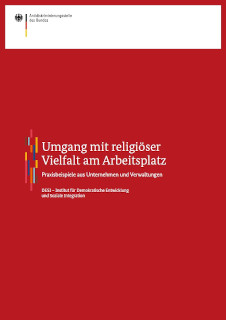Dealing with religious variety at the workplace
Practical examples from enterprises and administrations
- Factsheet on the research project -
Authors: DESI - Institute for Democratic Development and Social Integration, published by the Federal Anti-Discrimination Agency (FADA) Year of publication: 2016
Brief overview
The expert opinion presents practical examples at plant level and cross-company level, which are meant to facilitate and support the compatibility of religious affiliation and employment in everyday work routine, as well as to prevent discrimination.
For this purpose, research was made into private enterprises of various sizes (large-scale enterprises, small and medium-sized enterprises), federal administrative authorities, social welfare enterprises and industry-related institutions, and questions concerning their good practice were asked.
Terms of reference
The expert opinion aimed at gaining an overview of which measures are currently being applied to the daily practice at German companies to protect against discrimination at work on grounds of religious affiliation. To this end, they searched for procedures at plant and supra-farm level which
- support the compatibility of religious affiliation and employment in everyday work routine,
- prevent discrimination on grounds of a religious affiliation,
- promote equal opportunities for people of various religious affiliations in working life,
- will intervene in cases of discrimination on grounds of religious affiliation.
Course of action
In the run-up to this research, a matrix looking for examples of best practice was developed which made it possible to classify and attribute the different measures. Subsequently, a large-scale research was carried out to identify the approaches used at different enterprises. Written inquiries on this topic were submitted, inter alia, to the Chambers of Industry and Commerce, the Commissioners for Diversity of the Federal Laender or the voluntary welfare organisations at Laender level. Moreover, a second inquiry was made via the so-called snowball effect. In a third step, a survey among the employers was carried out and experts were interviewed. Based on the results of both measures, a compilation of examples of good practice was included in the present expert opinion.
Main results
- All in all, 15 different approaches were identified which were included in the expert opinion as examples of good practice.
- The research did not show any signs indicating that a large variety of best practice measures had been applied. On the contrary, many employers obviously did not know how to deal with religious diversity and their relevant in-house requirements.
- Most of those measures were from the field of corporate culture, for example codes of conduct, and from the area of work organisation. The latter refers to arrangements facilitating the practice of religion within company premises, for example a large variety of meals offered in canteens, prayer rooms, etc. Measures relating to other fields of work (e.g. codes of conduct or works agreements) are mostly incorporated in a more comprehensive diversity strategy.
- In hardly any of the enterprises surveyed religion is one of the priority topics in diversity management.
- Frequently, measures are an answer to a specific problem for which a solution geared to the needs of the company and the particular situation had to be found.
- Existing measures sensitive to religion refer particularly to the group of Muslims.
- Works councils or trade unions as well as religious associations still hardly deal with this subject yet.
Specific features of individual sectors of industry
In private enterprises ethnic diversity is often the starting point of individual measures. Consequently, the appreciation of religious diversity is part of the diversity management of companies, especially at the large-scale enterprises and this aspect frequently coincides with the issue of ethnic origin or also with gender. However, it is difficult to find good practices at small and medium-sized enterprises.
Federal administrative authorities emphasize their neutral stance towards religious affiliations. In this context, the acceptance of religious diversity is implicitly supported by, e.g. depersonalised application procedures or training campaigns for joining the public service.
In the context of church employers, it is particularly a lack of skilled staff as well as the necessity of a better intercultural cohesion in the social service sector that is decisive for an attitude which takes religious diversity into account. In this sector, it has to be stated that religious diversity is dealt with in a very defensive manner.

